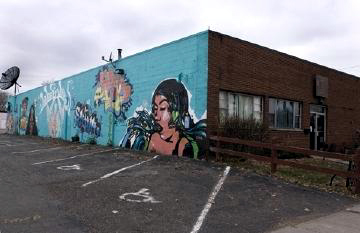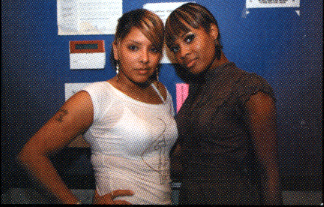Pi Bar
2532 25th Avenue South, Minneapolis, MN
| The most recent new bar for queer women in the Twin Cities followed in the footsteps of earlier social spaces—Foxy's Bar, Ladies Night, The Castle Royale, and Lucy's—but it also set out into uncharted territory. By all accounts, Pi Bar was the first bar/restaurant that exclusively catered to queer women in Minneapolis.
|
 Pi Bar shortly before closing in 2008. Courtesy of the Twin Cities Daily Planet: http://www.tcdailyplanet.net/article/2008/11/09/pi-bar.html |
| Two women pose for Lavender Magazine at Pi, 2007. |
These earlier organizations similarly offered social space as a response to the absence of nightlife options in Minneapolis—liquor-based establishments in Minneapolis continue a pattern that began with anti-prostitution ordinances in the Gateway District (see: The Dugout Bar).
|
Unfortunately, Pi’s borderland location between the Seward and Longfellow neighborhoods proved difficult to reach—the bar’s clientele could not reach the venue easily by public transportation. Located in a concentration of light industrial buildings, the bar was not supported by a coexisting residential community. Previous spaces for queer women used residential settlements as a primary business support—this was the case for the Lesbian Resource Center--located near Loring Park and a lesbian settlement on nearby Garfield Avenue (3)--and the Amazon Feminist/True Colors Bookstore near Powderhorn Park.
The establishment also opened in one of the unluckiest business eras since the late 1920s—Yule could not refinance payments on her $600,000 loan. Despite a community effort that raised $100,000, Pi closed in November of 2008.(4)
This entry is part of:
Minneapolis/St. Paul, MN: 100 Queer Places in Minnesota History, (1860-2010)
(1) Regan, Sheila. "Patrons Raise $100,000 in hopes attempt to save debt-ridden Pi Bar, slated to close this week." The Twin Cities Daily Planet, 11/9/2008. http://www.tcdailyplanet.net/article/2008/11/09/pi-bar.html
(2) Ibid.
(3) Tretter, Jean-Nickolaus. The Existence of a Gay Ghetto in Minneapolis. St. Paul, MN: Undergraduate paper submitted to the University of Minnesota’s Geography Department, 1976.
(4) Regan, Ibid.
